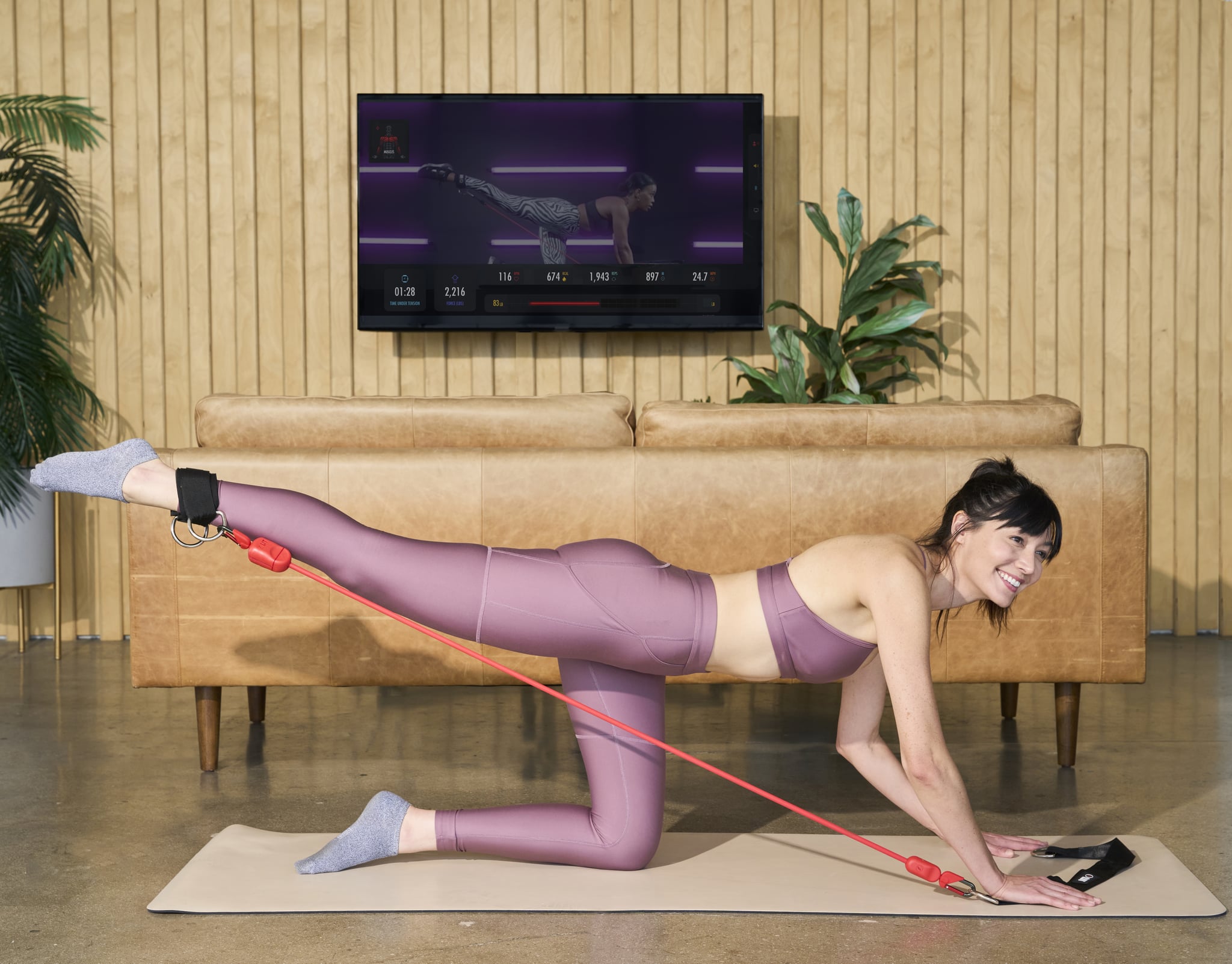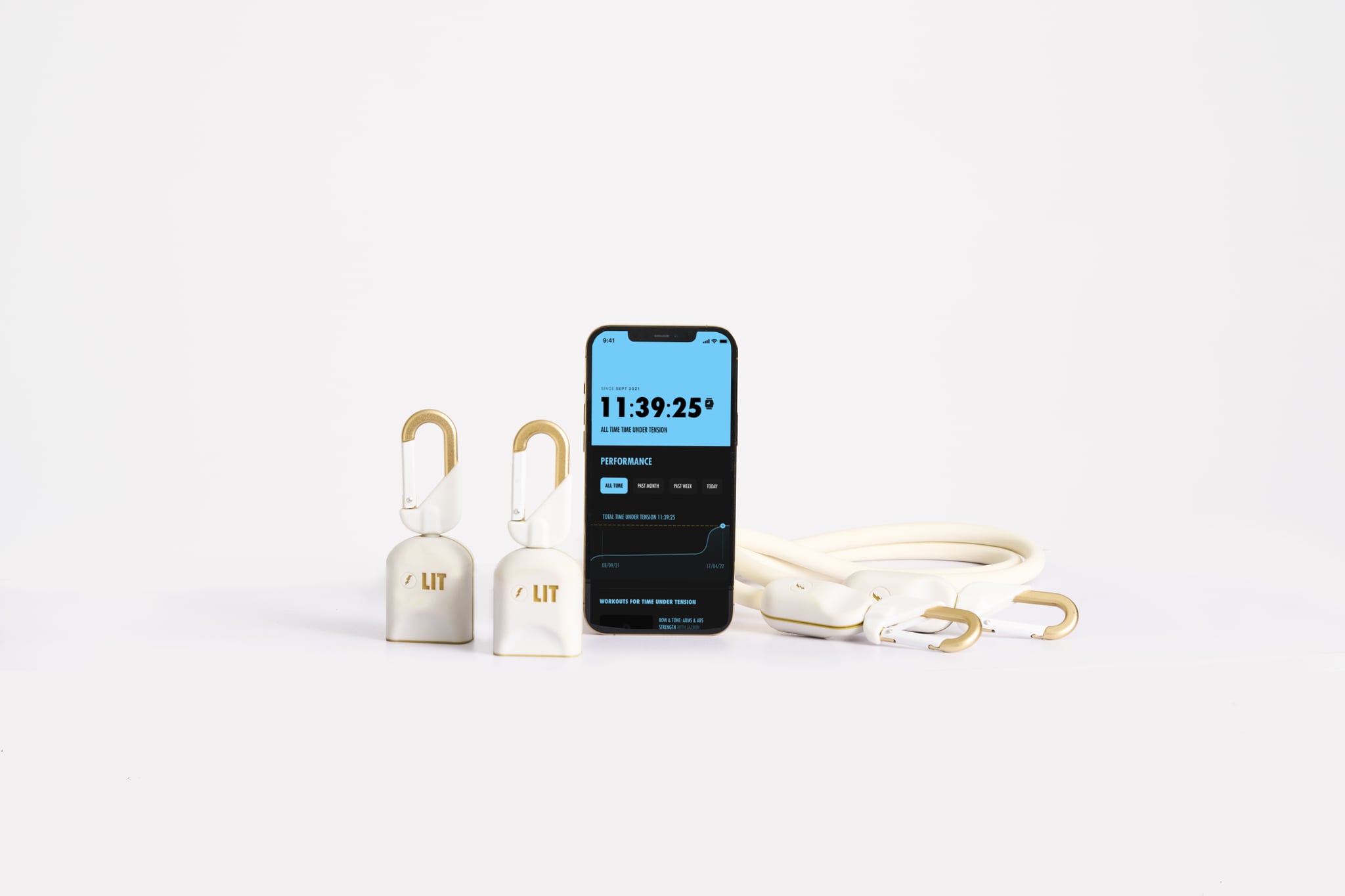Products You May Like
One of the biggest downsides to strength-training equipment is that it’s bulky. Whether you’ve invested in a few pairs of dumbbells or a full-fledged cable machine for your home, these things take up space (and usually aren’t the most aesthetic). Not to mention, they’re anything but portable. While you can absolutely get in an effective strength workout with your body weight alone, adding external resistance really expands the possibilities, allowing you to work in different planes of motion, target new muscles, and keep your training fresh.
Resistance bands are the best solution to this problem but have largely been left out of the “smart device” revolution that’s reached almost every other aspect of our fitness routines. That is, until now.
The LIT Method — the fitness brand responsible for this one-of-a-kind rower-reformer hybrid device — just released the LIT Axis ($199), and it’s bringing smart training to your resistance bands. This resistance training system can count your reps, calculate your resistance loads, and measure time under tension, while also requiring no charging and remaining completely portable.
“At the end of the day, people are being priced out of premium fitness,” LIT Method cofounder Taylor Norris explains to POPSUGAR. She and husband/fellow cofounder Justin Norris hope this device will eliminate that barrier and “open up a whole new range of possibilities for people.” Here’s what you need to know.
How the LIT Axis Works
At a glance, the LIT Axis looks like a basic (albeit very sleek) resistance band set: it comprises four resistance bands (for a load of up to 200 lbs), plus an anchor point and attachable handles and ankle straps. But the magic is contained in the two pocket-sized sensors that can attach to any of the bands. These sensors collect metrics, connect via Bluetooth to your phone or tablet, and display the info in real time on the LIT Method app ($10/month after a three-month free trial), where you can stream LIT Method classes and also cast them to your TV.
The Axis has a universal anchor that can be attached to a door, wall, bedpost, or even around a tree, similar to suspension training. You can also place it under your feet or hands if you’re doing exercises such as table-top leg lifts (shown below). While you’re working out, the Axis can count your reps, show how much resistance you’re lifting, record time under tension, and even point out muscle imbalances by comparing the movements on your left and right sides. For example, you may find you can lift 20 percent more with your right leg than your left.

What Are the Workouts Like?
While the Axis is a strength-training device, that’s far from the only type of workout you can do with it. In fact, it’s designed to replace your cable system, free weights, suspension trainer, and Pilates reformer, and it can be used to do more than 350 exercises, from boxing and squats to Pilates hundreds. You can access Axis-specific workouts and programs, such as the LIT Method’s Symmetrical Strength Training Programs, plus thousands of other classes on the LIT on-demand platform. Workout offerings range from 10 to 40 minutes, span many different modalities, and can be streamed both live and on demand. You can take classes with the founders or with celebrity trainers Jarret Janako and Lacey Stone, prenatal and HIIT expert Ashley Joi, and Pilates instructor Jazmin Rivers, for example. When you’re doing an Axis workout, your metrics will show up on the screen, so you can keep an eye on your performance as you’re working out.
What’s It Really Like Working Out With the LIT Axis?
I got to try the LIT Axis machine firsthand, and my first thought was: how is it so tiny and gathering all of these insights? Having experienced other “smart” gyms before, I found it pretty revolutionary how small and portable the LIT Axis is.
The Norrises took me through a workout. When doing bicep curls, I noticed my right arm was able to lift more weight than my left arm. This made a lot of sense since I carry my toddler with my right arm. This insight encouraged me to do more reps on my left in order to balance it out. (Now if only I could remember to hold my toddler on the left side, too.)
“People usually pick up things with one side of their body — whether it’s a baby, a suitcase, or anything, people develop dominant sides of their body. It’s what they do,” Taylor explains. “Our technology helps correct that imbalance because muscle imbalances are the most common cause of injuries.” This rang true for me as I’ve repeatedly had shoulder impingements on my right shoulder.
As I made my way through the session, the Axis accurately counted my reps as well as the total force (in pounds) I lifted. I love doing work with resistance bands, but it’s impossible to know how much “weight” you’re really moving with each exercise, so I found this intel to be super interesting. But what I love most about the insights the Axis offers is that it makes you competitive with yourself. Unlike a leaderboard, where you’re trying to compete with others, the LIT Axis is all about you.


